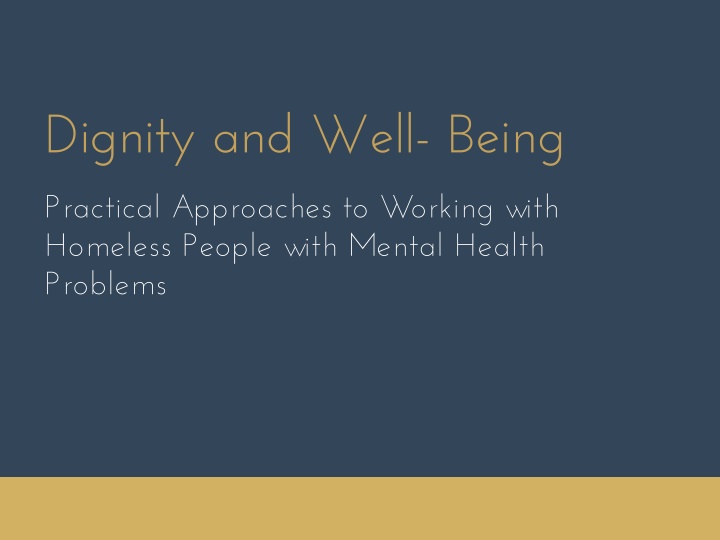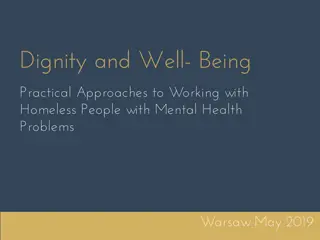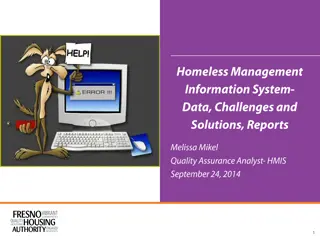Practical Approaches for Working with Homeless Individuals with Mental Health Challenges
This resource provides practical insights and strategies for supporting homeless individuals with mental health issues. It covers essential pillars such as housing rights, the Housing First model, challenges in implementation, continuity of care, and the importance of trauma-informed care. Emphasizing the need for tailored support, it highlights the significance of providing safe, high-quality housing and services that promote recovery from homelessness.
Download Presentation

Please find below an Image/Link to download the presentation.
The content on the website is provided AS IS for your information and personal use only. It may not be sold, licensed, or shared on other websites without obtaining consent from the author.If you encounter any issues during the download, it is possible that the publisher has removed the file from their server.
You are allowed to download the files provided on this website for personal or commercial use, subject to the condition that they are used lawfully. All files are the property of their respective owners.
The content on the website is provided AS IS for your information and personal use only. It may not be sold, licensed, or shared on other websites without obtaining consent from the author.
E N D
Presentation Transcript
Dignity and Well- Being Practical Approaches to Working with Homeless People with Mental Health Problems
Housing Pillar Practical approaches to working with homeless people with mental health problems
Housing as a right Immediacy - Access to shelter and Housing ASAP Choice Support Quality of housing or shelter provided
Housing First as a Solution Housing First Model - Housing without the necessary pre-conditions of being sober or compliant with medication Dr Sam Tsemberis pioneered the model Homes not hostels being the solution Large Evidence base of research that the model works
Challenges with Implementing the Model Finding the homes Housing First, but not Housing only, for it to work it must the people we are supporting must have all the supports
Continuity of Care in Housing Shelter Hostels Transitional Housing Number of Homes on the one site Scattered site housing as proposed in Housing First model
Key learning of the Importance of Trauma Informed Care Awareness that many of the people we work with have experienced trauma Awareness of the impact of this Trauma Designing servcies that at the very least don t seek to re-traumatise
Key learning of the Importance of Trauma Informed Care The importance of staff being competent in person centred intervention, active listening, empathy, kindness Physical design of homes and even hostels are places people feel safe and are maintained to a high quality We do this not just to have nice, clean, welcoming services but because it works in helping people recover from homelessness
Case Study: Ireland Sli Nua Apartments Athlone & Sean MacDermott Street Dublin Independent living but with visiting supports. People have safe homes that are well maintained. People that are living there have spent many years being homeless and have mental health and addiction supports needs. 8 out of 10 have manged to maintain their homes and not relapse into street homelessness
Dignity and Well-Being The Key to a secure and safe home is the key to other opportunties:
First Vice President of EU Parliament Mairead McGuinness MEP meeting with and listening to Servcie Users in Midlands Simon Community























